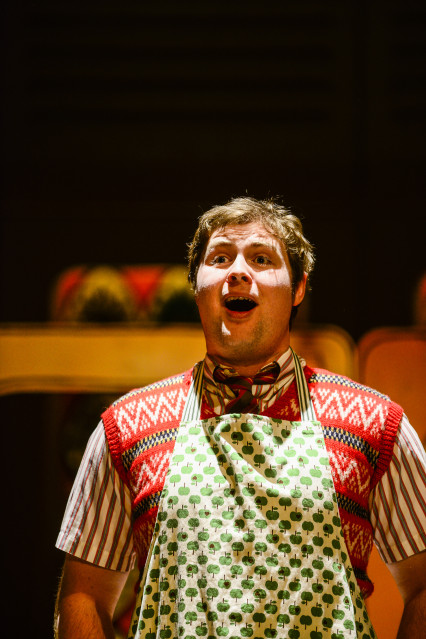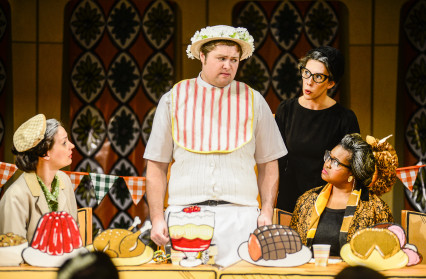Royal Welsh College Soloists/Royal Welsh College Chamber Ensemble
Director: Martin Constantine
Conductor: David Jones
Dora Stoutzker Hall, Royal Welsh College of Music and Drama, April 1 2015
Laura Curry, a post-graduate vocal studies student at the Royal Welsh College of Music and Drama, reminded us in her cogent and helpful pre-performance talk that Albert Herring (1947) was Britten’s only full comic opera, and also that he wrote it in an attempt to recoup some of the financial losses associated with his previous opera The Rape of Lucretia (1946). Whether or not he succeeded in the latter aim, Britten did little further comic writing. So was Albert Herring a failed experiment?
Britten set this opera in an imaginary small Suffolk town in 1900, seeking to satirise the hypocrisy of Victorian morality as demonstrated by the local dignitaries. When I saw Mid Wales Opera’s production in 2013 as part of the Britten 100 season I found it dated, even though it had been brought forward to the 1970s. This RWCMD production was set in the 1950s. Moving it to that time in order to highlight the fact that the relaxation of some moral restrictions during the war had not continued afterwards did not change my view of the piece. For all that the RWCMD singers embraced the challenge with energy and verve, and were well received by a near-capacity audience, I was left wondering whether staging this opera is worth all the effort. That effort is a considerable one.
In the advance publicity the production was described as semi-staged, but ended up being, to all intents and purposes, fully-staged. The Dora Stoutzker Hall was designed as a chamber recital hall for the 21st century, and works very well as such. As a venue for staged opera, however, it is not ideal, notably because of the absence of an orchestra pit. The students of the RWCMD Chamber Orchestra played with as much skill and pazazz as their colleagues sang, but the College Conductor in residence, David Jones, needed to moderate their enthusiasm a little to fit the restrictions of the performing space. I observed that I was not the only member of the audience on this occasion who found the balance between the ensemble and the singers wanting, or, to put it bluntly, the band too loud a lot of the time, especially the percussion. This was particularly challenging for the mezzos in the cast, and frustrating for us audience members who couldn’t make out the words.
The words are a problem in themselves. Eric Crozier’s libretto, in rhyming couplets, might have seemed witty and saucy to late 1940s audiences but nowadays these sound rather lame, for example when the unfortunate Albert sings of his spiked drink: ‘The taste of that lemonade; wonder how it’s made.’
The opera opened, in this staging, with Florence Pike, housekeeper to Lady Billows, looking out to the auditorium through opera glasses. Above her was hanging a huge pair of spectacles. Striking, but I wasn’t sure why, and I was even less sure why a group of bizarrely coiffured and bespectacled doppelgangers was introduced who, having first been mere scene-shifters, later also took part in some kind of audience surveillance operation. They reminded me of the ‘love-spotters’ in Kneehigh Theatre’s glorious production of Tristan and Yseult (2013) but, sadly, without the humour which they invoked so successfully.

The characters in Albert Herring are caricatures and surely meant to be, and the singers in this production did well enough in portraying them as such, but I question the fussy gestures given to the members of the May Day festival committee. And Albert’s mother slapping his bare bum to a percussive accompaniment at the end of Act I, in what felt like a desperate attempt to up the proportion of laughs, felt bizarrely transgressive!
The Director, Martin Constantine, who in February this time took up an International Chair in Directing at the RWCMD, has much experience of working with young opera singers, including as Director of the well-received WNO Youth Opera production of Paul Bunyan in 2013 (see Steph Power’s review here). One way in which Albert Herring is a good choice for a student production is that the characters need to be larger than life, which gives the singers plenty of scope to develop their dramatic skills. All the singers in this cast rose to that challenge and clearly enjoyed doing so. It was good to have the opportunity to track the development of some of the students, such as young Welsh tenor Emyr Wyn Jones, whom I saw last in the WNO Paul Bunyan and talked to at that time about his experience in that, and who is now on the MA Opera performance course at the RWCMD.
I think most of my dissatisfaction with this production is to do with the opera itself, both music and words. Without doubt it plays an important role in the development of English opera in the mid-20th century, but I think that this merits academic attention more than revived performance. In her pre-performance talk Laura Curry alerted us to the different music styles which Britten used for different characters – military marches for Florence Pike for example, in contrast to the florid virtuosic material given to Lady Billows. All very interesting, but frankly the most memorable music in the opera is that of the counting song which Britten gives to the children. As for comedy, Britten did subsequently demonstrate that he could deliver it in the music for the Rude Mechanicals in his setting of Shakespeare’s A Midsummer Night’s Dream (1960), but his best operatic writing is surely in the tragic dramas.
Britten’s desire to raise the profile of English opera and his founding (with Eric Crozier and the artist and designer John Piper) of the English Opera Group, which gave the premiere of Albert Herring, led to the commissioning of a series of new operas of the following decades and a consequent enrichment of the canon of 20th century English opera. Would that more of it would be revived – when do we ever get to hear, for example, John Gardner’s The Visitors, or Thea Musgrave’s The Voice of Ariadne, both of which were commissioned and produced by the English Opera Group in the early 1970s? It would be good to see music colleges like the RWCMD giving us the opportunity to hear some of this all but forgotten repertoire.
Photographs by Kirsten McTernan



 Enjoyed this article? Support our writers directly by buying them a coffee and clicking this link.
Enjoyed this article? Support our writers directly by buying them a coffee and clicking this link.







